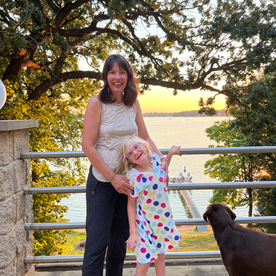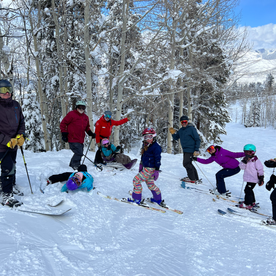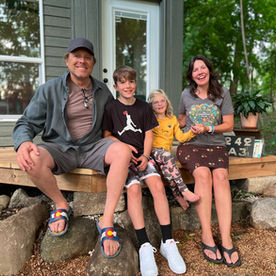In June of 2016, the doctor called us with the results of Addy’s MRI. We had this MRI done after months of investigating why Addy wasn't making the "normal" 12-18 month old milestones. Our son Jax was at the park across the street celebrating his last day of preschool. Brent answered the call and immediately came to get me. He told me what she said. "We think your daughter has a condition called 4H Syndrome Leukodystrophy". I saw notes scribbled on a piece of paper. I studied them in disbelief and sobbed. Every June I relive every little detail of that day and it is challenging to say the least.
Each year we walk through this grief and sadness but get a little stronger. We reach out for the support of friends and family. We are able to talk about our joys, challenges, what it took to get where we are today. We get to share the news of how Addy is attending kindergarten - at the same school as her brother Jax! - and is thriving. No one could have been more overwhelmed than we were, and yet, here we are somehow doing things and living a life that seemed impossible three years ago.
No one wants to hear the news that their child has a progressive degenerative condition. From the moment we heard those words we were changed forever. We started our process of transformation - both individually and as a family. For me, it felt like I was dying and in a sense I was. I realize now that the person I once was ceases to exist but I am stronger now, able to be present and look forward to the joys in each day.
Every time we visit our doctors, specialists, therapists, help her recover from an illness or even attend a gathering we come to understand what exactly this diagnosis means. It changes you on many levels. You start to go through each thing our child will never do. Like how she will never walk, drive, attend college or live on her own. We mourn these things and the life we thought would be yet we adapt and give Addy the best life and experiences possible.
There was a time when we were paralyzed with grief about how easy our life used to be and how hard it has become. Our relationships with friends and family who don't know what to say or how to help has changed. But over time we realized that we have a choice to make, to be overwhelmed and saddened by this condition or find a way to find happiness and joy in what is possible. It is our mission to help give her what she deserves. As her parents, we are her voice and her biggest advocate but Addy inspires so many people with her smile, laughter, and unstoppable determination.
What is 4H leukodystrophy? 4H leukodystrophy is a rare genetic disorder that affects the nervous system. The name is short for hypomyelination with hypogonadotropic hypogonadism and hypodontia. The condition is also known as 4H syndrome or Pol 3-related leukodystrophy.
Leukodystrophy is a group of conditions that affect the white matter of the brain. These diseases damage the myelin sheath, which surrounds and protects the nerve cells in the brain and spinal cord and speeds transmission of messages between cells.
The process of the body forming this protective myelin sheath is called myelination. Typically, myelination develops in the first few years of life. Hypomyelination means that the body is unable to produce myelin at normal levels. This prevents the body from completing normal myelination of the brain, and in some cases, the nerves outside the brain.
4H leukodystrophy is the combination of that myelin deficiency and two other conditions: hypogonadotropic hypogonadism (a condition that results in delayed puberty) and hypodontia (having fewer teeth than normal or an abnormal development of those teeth).
People with 4H leukodystrophy often have motor problems, including stiffness of the muscles and joints and problems with balance and coordination. They may also have movement disorders, including tremor or difficulty controlling smooth movements of their arms and legs. As infants, they may have delay in teething or have teeth appear in an unusual order. They are usually small for their age, and they do not go through typical puberty.
It's been an adventure-filled, challenging yet joyful 9 years since Addy was diagnosed with 4H. One thing that always rings true is that she has a huge support team. That team is always rooting for her, supporting her in every way. From family to friends, doctors and therapists and teachers too. We're always strADDYgizing to make her life the BEST.
It's hard to keep track of all of the amazing things she does but here are a few pictures that tell her story:















